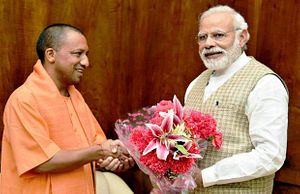At the beginning of the month in the northeastern state of Assam, the Indian government effectively stripped 4 million people, mostly Muslims, of their citizenship, branding them as illegal immigrants from neighboring Bangladesh. The government also announced it will be deporting “illegal” Rohingya refugees, and a politician from India’s ruling party, the Hindu nationalist Bharatiya Janata Party (BJP), declared that “if these … illegal immigrants do not leave India respectfully, then they should be shot and eliminated.”
Under Prime Minister Narendra Modi, India’s international image has become more robust, and the United States has designated India as its partner in balancing China’s growing influence in the Indo-Pacific. However, these recent developments contradict the U.S. vision for India to “strengthen the fabric of stability” in the region. Since Modi’s election in 2014, there has been a significant increase in anti-minority rhetoric and mob violence committed by Hindu nationalist groups against Muslims and other minorities. Although India’s strategic importance has led the U.S. government to largely ignore these domestic issues, the dangerous effects unleashed by Hindu nationalism have had a destabilizing effect in South Asia, compromising India’s ability to play the leading regional role the United States seeks.
Implications for Regional Stability
In some ways, Hindu nationalism, the political ideology that guides Modi’s BJP party, resembles right-wing nationalist movements around the world, advocating for economic protectionism and increased border security. Its distinguishing factor, though, is its core belief that India’s national identity should be synonymous with a Hindu identity. In a country where a fifth of the population is not Hindu, Hindu nationalism’s hardliners argue that India should become a Hindu state, and have openly incited violence against minorities, particularly Muslims and Christians. For decades, liberal voices in India have spoken out against the values espoused by Hindu nationalists. Now, Hindu nationalism is threatening South Asia’s security and stability.
Expressions of Hindu nationalism have contributed to a worsening of tensions in the disputed region of Kashmir, over which India and Pakistan have fought numerous wars, nearly escalating to a nuclear conflict in 1999. The Indian-administered portion of Kashmir is India’s only Muslim-majority state, and the BJP’s perceived anti-Muslim politics have turned an increasing number of Kashmiris against the Indian government, diminishing hopes for a peaceful resolution to the conflict.
Expressions of Hindu nationalism are also transforming India’s refugee and citizenship policies. In addition to its actions in Assam, the BJP government has introduced an amendment to its citizenship laws that would make it easier for non-Muslim refugees to receive Indian citizenship. This is taking place under the rhetoric of defending a “homeland” against unwanted immigrants that can be seen with right-wing political movements worldwide.
Finally, Hindu nationalist-inspired violence against minorities could incite new cycles of retaliatory violence in the region, as it has in the past. India’s Muslim population is currently the second-largest in the world — on track to become the world’s largest by 2050. Although a minuscule number of Indian Muslims have joined terrorist organizations, some argue that increasing marginalization could increase the appeal of violent extremism. In the past few years, both ISIS and al-Qaeda have called on Indian Muslims to “take revenge,” and ISIS-inspired attacks have taken place in India, not to mention Afghanistan, Pakistan, and Bangladesh. Thus, while the U.S. government sees India as a stabilizing force in the region, Hindu nationalist-inspired policies have the potential to exacerbate current crises and trigger new ones.
Recommendations
What can the United States do about the apparent rising negative effects of Hindu nationalism? After all, the Indian government has not taken well to past U.S. criticism of religious freedom in India, and offending an important strategic partner can have costs.
One approach is to tackle this issue at home. Hindu nationalist groups in India enjoy significant ideological and financial support from the Hindu diaspora in the United States. One U.S.-based Hindu nationalist organization, the Hindu Swayamsevak Sangh (HSS), operates 172 chapters nationwide with the goal of “engendering … support for its Hindutva [Hindu nationalism] ideology.” Additionally, Indian-American charitable organizations have allegedly sent millions of dollars to Hindu nationalist-affiliated groups in India.
Next month, in suburban Chicago, members of the HSS and the American affiliate of the Vishwa Hindu Parishad, a Hindu nationalist organization described by the CIA as a “militant religious group,” are organizing a “World Hindu Congress.” This conference enjoys the support of U.S. government officials. Congresswoman Tulsi Gabbard (D-HI) was named chairwoman, while Congressman Raja Krishnamoorthi (D-IL) will be attending and has released a video of support. Prominent Hindu nationalist figures will be speaking, such as Mohan Bhagwat, head of India’s largest Hindu nationalist organization. Bhagwat’s organization, the Rashtriya Swayamsevak Sangh, has been banned by previous Indian governments (the HSS is its American counterpart), and he himself has allegedly encouraged domestic terror attacks.
While anti-minority violence within India is a challenge for the Indian government to tackle, the United States can work to de-legitimize dangerous elements of Hindu nationalism within its own borders. This would mean cracking down on charitable funds that are sent from American citizens to Hindu nationalist groups in India that have a record of spreading violent, anti-minority rhetoric, as suggested by the U.S. Commission on International Religious Freedom. Additionally, the United States could send a strong signal by denying visas to Hindu nationalist leaders like Mohan Bhagwat who have been invited to the World Hindu Congress. Taking a quiet but firm stance on this issue will further U.S. strategic interests in promoting stability in South Asia and India’s readiness to lead in the Indo-Pacific.
Nikhil Mandalaparthy is a researcher with the Stimson Center’s South Asia Program

































